Handsome British stage actor and film actor Basil Gill (1877-1955) was a popular matinee idol during the 1910s. His stage career included many major roles in plays of William Shakespeare but also in modern plays. Between 1911 and 1938, he also appeared in thirty-five British silent and sound films.
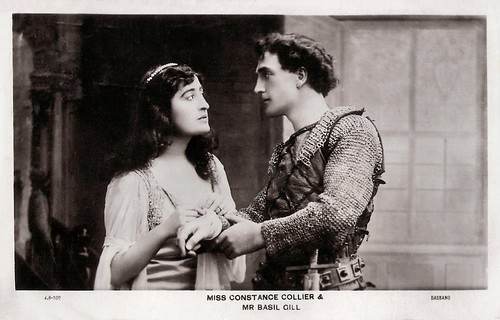
Basil Gill and Constance Collier. British postcard by J.J. Samuels, London, no. 4-8-102. Photo: Bassano.

British postcard issued with Sarony Cigarettes, no. 67 of a second series of 42 Cinema Stars. Photo: Gaumont. Publicity still for High Treason (Maurice Elvey, 1929).
Basil Gill was born in 1877 in Birkenhead, Cheshire, England. He was a son of the Rev. John Gill, of Cambridge.
For approximately two years until May 1894, he taught art at The Grammar School, Wallington, U.K. before leaving for a post in Switzerland.
His first stage appearance was in The Sign of the Cross, Wilson Barrett's most successful play, in Bury, Lancashire in 1897. The following year he appeared in this play in London. He then toured Australia and the USA with The Sign of the Cross and Ben-Hur. American newspapers called him 'the handsomest man on the stage'.
In 1903 Gill joined Herbert Beerbohm Tree's company at His Majesty's Theatre, London, and played several important roles in plays of William Shakespeare. He left the company in 1907.
He was regarded as a matinee idol and also played romantic parts in modern plays. But Gill continued to perform in Shakespeare's plays during his career. The accomplished actor received numerous reviews commenting on the clarity and quality of his voice.
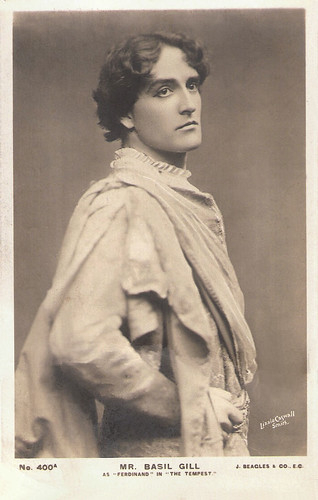
British postcard by Beagles & Co, London, no. 400A. Photo: Lizzie Caswall Smith. Basil Gill as Ferdinand in the play The Tempest by William Shakespeare.
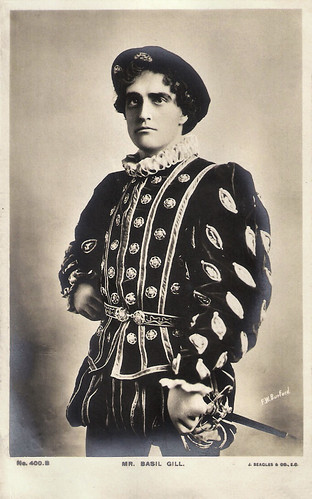
British postcard by Beagles & Co, London, no. 400B. Photo: F.W. Burford.
Basil Gill made his film debut in the silent historical film Henry VIII (Will Barker, 1911). In this film he appeared with Arthur Bourchier and Herbert Beerbohm Tree, on whose version of William Shakespeare and John Fletcher's play the film was based. The film's success sparked a mini-boom in Shakespeare adaptations.
From then on the popular matinee idol played romantic leads and character roles in period drama on screen from 1911. He appeared in such silent films as On the Banks of Allan Water (Wilfred Noy, 1916), the drama Missing the Tide (Walter West, 1918) starring Violet Hopson, and The Rocks of Valpre (Maurice Elvey, 1919).
In 1926, Gill appeared in two short films made in the DeForest Phonofilm sound-on-film process, Santa Claus (George A. Cooper, 1926) as the title character, and Julius Caesar (George A. Cooper, 1926) as Brutus.
He appeared opposite Benita Hume in the 'Peace Picture' High Treason (Maurice Elvey, 1929), in which women unite to prevent financiers from engineering a second world war.
Gill co-starred with Madeleine Carroll in the comedy The School for Scandal (Thorold Dickinson, Maurice Elvey, 1930), the first sound film adaptation of Richard Brinsley Sheridan's play The School for Scandal. It is also the only feature-length film shot using the unsuccessful Raycol colour process.
Gill appeared in many more films, including The Wandering Jew (Maurice Elvey, 1933) starring Conrad Veidt as the Jew who urges Roman authorities to crucify Jesus and release Barabbas. As a punishment, he is condemned by God to wander the Earth for many centuries. His final film was The Citadel (King Vidor, 1938) with Robert Donat.
Basil Gill died in 1955 in Hove, East Sussex, England. He was married to actress Margaret von Cavania.
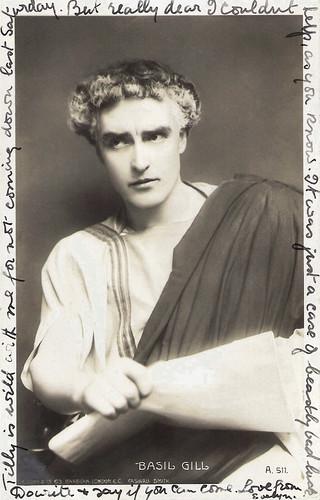
British postcard by H. Dunn & Co, London, no. A. 511. Photo: Caswall Smith.
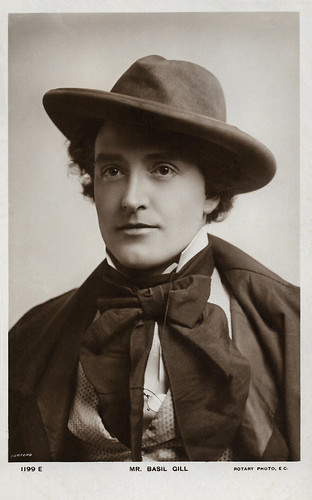
British postcard by Rotary, no. 1199 E. Photo: F.W. Burford.
Sources: Shakespeare & The Players, Wikipedia and IMDb.

Basil Gill and Constance Collier. British postcard by J.J. Samuels, London, no. 4-8-102. Photo: Bassano.

British postcard issued with Sarony Cigarettes, no. 67 of a second series of 42 Cinema Stars. Photo: Gaumont. Publicity still for High Treason (Maurice Elvey, 1929).
The handsomest man on the stage
Basil Gill was born in 1877 in Birkenhead, Cheshire, England. He was a son of the Rev. John Gill, of Cambridge.
For approximately two years until May 1894, he taught art at The Grammar School, Wallington, U.K. before leaving for a post in Switzerland.
His first stage appearance was in The Sign of the Cross, Wilson Barrett's most successful play, in Bury, Lancashire in 1897. The following year he appeared in this play in London. He then toured Australia and the USA with The Sign of the Cross and Ben-Hur. American newspapers called him 'the handsomest man on the stage'.
In 1903 Gill joined Herbert Beerbohm Tree's company at His Majesty's Theatre, London, and played several important roles in plays of William Shakespeare. He left the company in 1907.
He was regarded as a matinee idol and also played romantic parts in modern plays. But Gill continued to perform in Shakespeare's plays during his career. The accomplished actor received numerous reviews commenting on the clarity and quality of his voice.

British postcard by Beagles & Co, London, no. 400A. Photo: Lizzie Caswall Smith. Basil Gill as Ferdinand in the play The Tempest by William Shakespeare.

British postcard by Beagles & Co, London, no. 400B. Photo: F.W. Burford.
A mini-boom in Shakespeare adaptations
Basil Gill made his film debut in the silent historical film Henry VIII (Will Barker, 1911). In this film he appeared with Arthur Bourchier and Herbert Beerbohm Tree, on whose version of William Shakespeare and John Fletcher's play the film was based. The film's success sparked a mini-boom in Shakespeare adaptations.
From then on the popular matinee idol played romantic leads and character roles in period drama on screen from 1911. He appeared in such silent films as On the Banks of Allan Water (Wilfred Noy, 1916), the drama Missing the Tide (Walter West, 1918) starring Violet Hopson, and The Rocks of Valpre (Maurice Elvey, 1919).
In 1926, Gill appeared in two short films made in the DeForest Phonofilm sound-on-film process, Santa Claus (George A. Cooper, 1926) as the title character, and Julius Caesar (George A. Cooper, 1926) as Brutus.
He appeared opposite Benita Hume in the 'Peace Picture' High Treason (Maurice Elvey, 1929), in which women unite to prevent financiers from engineering a second world war.
Gill co-starred with Madeleine Carroll in the comedy The School for Scandal (Thorold Dickinson, Maurice Elvey, 1930), the first sound film adaptation of Richard Brinsley Sheridan's play The School for Scandal. It is also the only feature-length film shot using the unsuccessful Raycol colour process.
Gill appeared in many more films, including The Wandering Jew (Maurice Elvey, 1933) starring Conrad Veidt as the Jew who urges Roman authorities to crucify Jesus and release Barabbas. As a punishment, he is condemned by God to wander the Earth for many centuries. His final film was The Citadel (King Vidor, 1938) with Robert Donat.
Basil Gill died in 1955 in Hove, East Sussex, England. He was married to actress Margaret von Cavania.

British postcard by H. Dunn & Co, London, no. A. 511. Photo: Caswall Smith.

British postcard by Rotary, no. 1199 E. Photo: F.W. Burford.
Sources: Shakespeare & The Players, Wikipedia and IMDb.
No comments:
Post a Comment